Unit1 Where did you go on vacation? Section B 2b Reading课文知识点串讲课件(共19张PPT)
文档属性
| 名称 | Unit1 Where did you go on vacation? Section B 2b Reading课文知识点串讲课件(共19张PPT) | 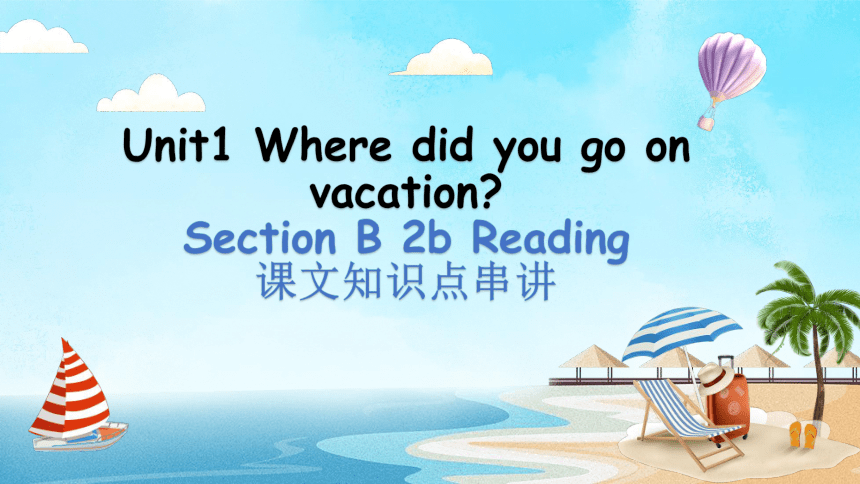 | |
| 格式 | zip | ||
| 文件大小 | 5.5MB | ||
| 资源类型 | 教案 | ||
| 版本资源 | 人教新目标(Go for it)版 | ||
| 科目 | 英语 | ||
| 更新时间 | 2022-10-10 15:23:58 | ||
图片预览

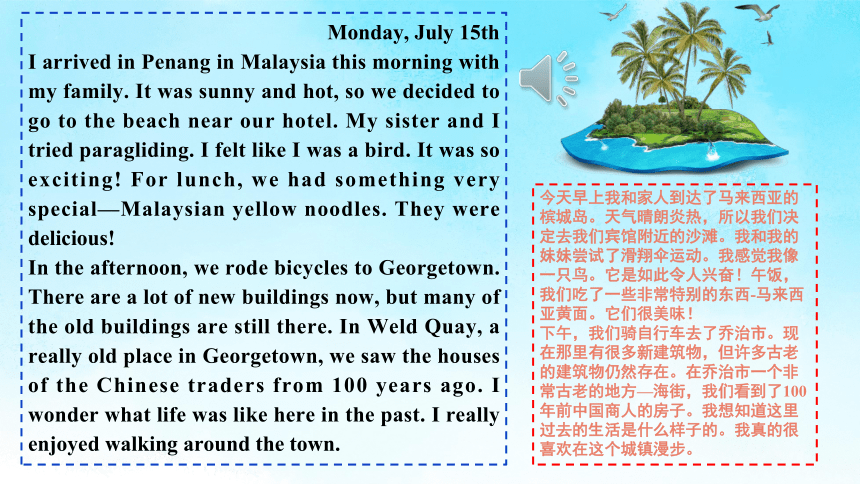
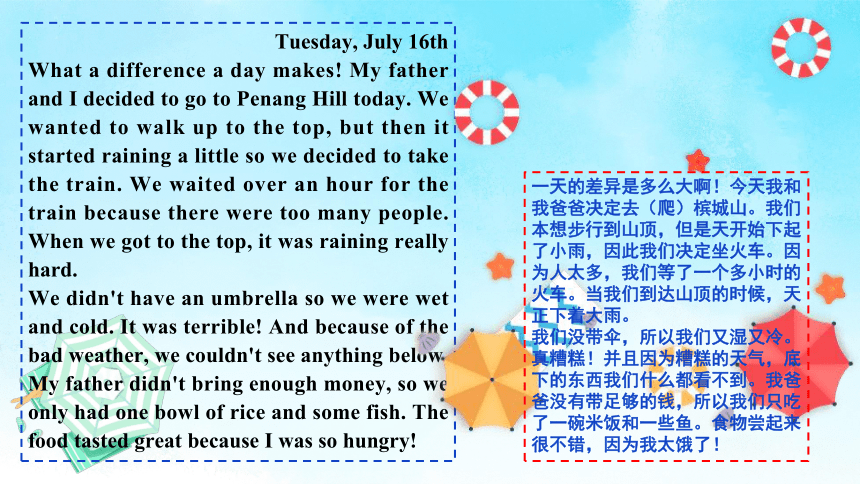
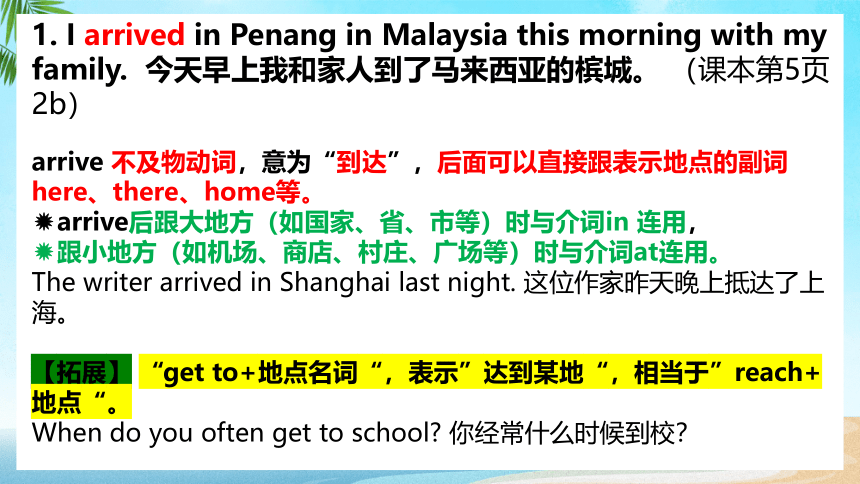
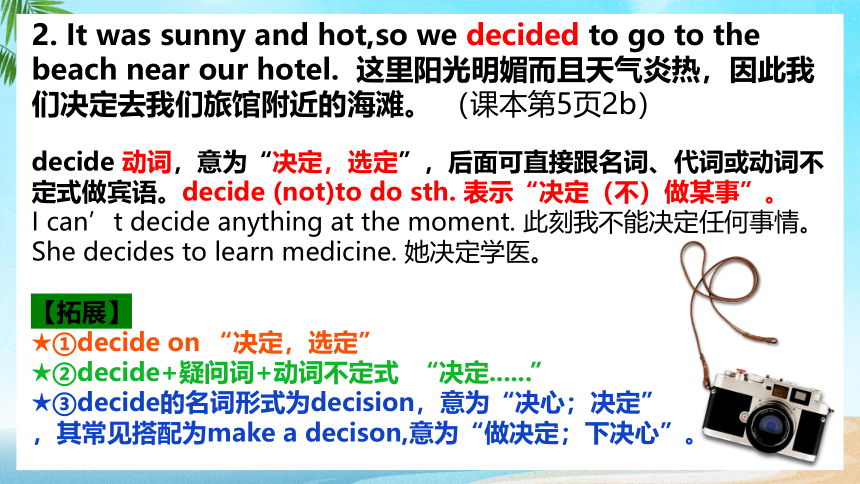
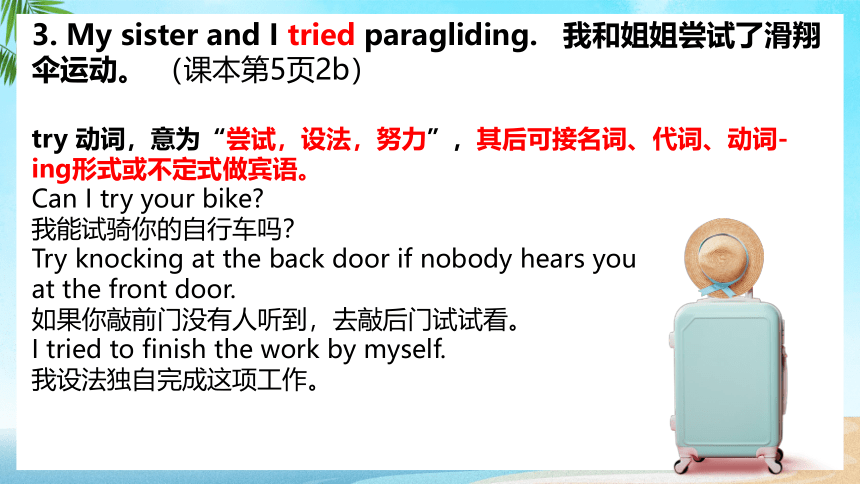
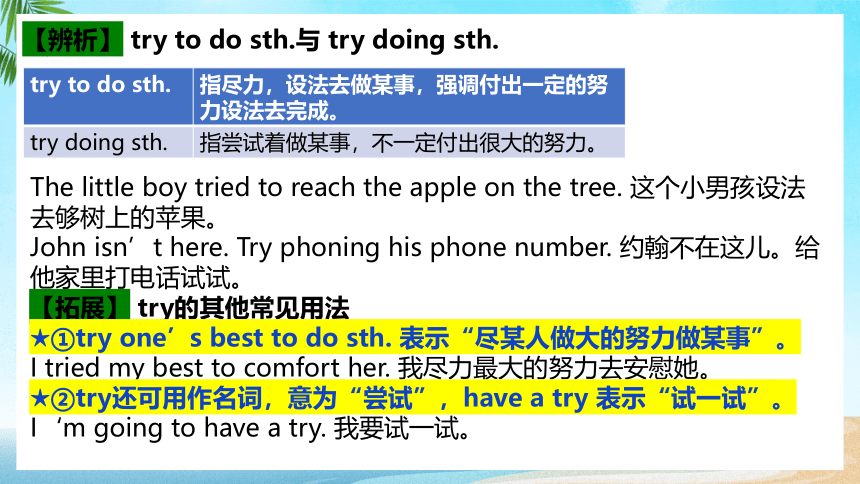
文档简介
(共19张PPT)
Unit1 Where did you go on vacation
Section B 2b Reading
课文知识点串讲
Monday, July 15th
I arrived in Penang in Malaysia this morning with my family. It was sunny and hot, so we decided to go to the beach near our hotel. My sister and I tried paragliding. I felt like I was a bird. It was so exciting! For lunch, we had something very special—Malaysian yellow noodles. They were delicious!
In the afternoon, we rode bicycles to Georgetown. There are a lot of new buildings now, but many of the old buildings are still there. In Weld Quay, a really old place in Georgetown, we saw the houses of the Chinese traders from 100 years ago. I wonder what life was like here in the past. I really enjoyed walking around the town.
今天早上我和家人到达了马来西亚的槟城岛。天气晴朗炎热,所以我们决定去我们宾馆附近的沙滩。我和我的妹妹尝试了滑翔伞运动。我感觉我像一只鸟。它是如此令人兴奋!午饭,我们吃了一些非常特别的东西-马来西亚黄面。它们很美味!
下午,我们骑自行车去了乔治市。现在那里有很多新建筑物,但许多古老的建筑物仍然存在。在乔治市一个非常古老的地方—海街,我们看到了100年前中国商人的房子。我想知道这里过去的生活是什么样子的。我真的很喜欢在这个城镇漫步。
Tuesday, July 16th
What a difference a day makes! My father and I decided to go to Penang Hill today. We wanted to walk up to the top, but then it started raining a little so we decided to take the train. We waited over an hour for the train because there were too many people. When we got to the top, it was raining really hard.
We didn't have an umbrella so we were wet and cold. It was terrible! And because of the bad weather, we couldn't see anything below. My father didn't bring enough money, so we only had one bowl of rice and some fish. The food tasted great because I was so hungry!
一天的差异是多么大啊!今天我和我爸爸决定去(爬)槟城山。我们本想步行到山顶,但是天开始下起了小雨,因此我们决定坐火车。因为人太多,我们等了一个多小时的火车。当我们到达山顶的时候,天正下着大雨。
我们没带伞,所以我们又湿又冷。真糟糕!并且因为糟糕的天气,底下的东西我们什么都看不到。我爸爸没有带足够的钱,所以我们只吃了一碗米饭和一些鱼。食物尝起来很不错,因为我太饿了!
1. I arrived in Penang in Malaysia this morning with my family. 今天早上我和家人到了马来西亚的槟城。 (课本第5页2b)
arrive 不及物动词,意为“到达”,后面可以直接跟表示地点的副词here、there、home等。
arrive后跟大地方(如国家、省、市等)时与介词in 连用,
跟小地方(如机场、商店、村庄、广场等)时与介词at连用。
The writer arrived in Shanghai last night. 这位作家昨天晚上抵达了上海。
【拓展】 “get to+地点名词“,表示”达到某地“,相当于”reach+地点“。
When do you often get to school 你经常什么时候到校?
2. It was sunny and hot,so we decided to go to the beach near our hotel. 这里阳光明媚而且天气炎热,因此我们决定去我们旅馆附近的海滩。 (课本第5页2b)
decide 动词,意为“决定,选定”,后面可直接跟名词、代词或动词不定式做宾语。decide (not)to do sth. 表示“决定(不)做某事”。
I can’t decide anything at the moment. 此刻我不能决定任何事情。
She decides to learn medicine. 她决定学医。
【拓展】
★①decide on “决定,选定”
★②decide+疑问词+动词不定式 “决定......”
★③decide的名词形式为decision,意为“决心;决定”
,其常见搭配为make a decison,意为“做决定;下决心”。
3. My sister and I tried paragliding. 我和姐姐尝试了滑翔伞运动。 (课本第5页2b)
try 动词,意为“尝试,设法,努力”,其后可接名词、代词、动词-ing形式或不定式做宾语。
Can I try your bike
我能试骑你的自行车吗?
Try knocking at the back door if nobody hears you
at the front door.
如果你敲前门没有人听到,去敲后门试试看。
I tried to finish the work by myself.
我设法独自完成这项工作。
【辨析】 try to do sth.与 try doing sth.
try to do sth. 指尽力,设法去做某事,强调付出一定的努力设法去完成。
try doing sth. 指尝试着做某事,不一定付出很大的努力。
The little boy tried to reach the apple on the tree. 这个小男孩设法去够树上的苹果。
John isn’t here. Try phoning his phone number. 约翰不在这儿。给他家里打电话试试。
【拓展】 try的其他常见用法
★①try one’s best to do sth. 表示“尽某人做大的努力做某事”。
I tried my best to comfort her. 我尽力最大的努力去安慰她。
★②try还可用作名词,意为“尝试”,have a try 表示“试一试”。
I‘m going to have a try. 我要试一试。
4. I felt like I was a bird. 我感觉我像一只鸟。 (课本第5页2b)
feel like 表示“给......的感觉;感受到;感觉像”,后接名词或从句。此处felt是feel的过去式。
It feels like rain soon. 感觉像是马上要下雨了。
She feels like she is in a very nice dream. 她感觉像在美梦里一样。
【拓展】
★①feel like+名词/代词,表示“想要......”。
I feel like a rest after the long journey. 长途旅行后我想休息一下。
★②feel like+doing sth. 意为“想做某事”,相当于want to do sth. 或would like to do sth.
I feel like eating outside tonight.=I want to eat outside tonight.=I would like to eat outside tonight. 今晚我想出去吃饭。
5. I wonder what life was like here in the past. 我想知道过去这里的生活是什么样的。 (课本第5页2b)
(1)wonder此处用作动词,意为“想知道;琢磨”,相当于want to know.
其常用结构有:
“I wonder if...”,意为”我想知道是否......“;
”I wonder+wh-从句“,意为”我想知道....”,此时从句必须用陈述语序。
I wonder if you can help me.
我想知道你是否能帮助我。
I wonder who he is.
我想知道他是谁。
【拓展】
wonder还可用作名词,意为“奇观;奇才;奇迹”。
其形容词形式是wonderful,意为“精彩的;绝妙的”。
That tennis player is a wonder.
那位网球运动员是个奇才。
We had wonderful weather during the holiday here.
我们在这里度假期间,天气非常好。
(2)“What be...like ” 表示”......怎么样?/......是什么样子?“。
What’s the weather like
天气怎么样?
What is the bag like
那个包是什么样子的?
6. I really enjoyed walking around the town. 我非常喜欢在镇上四处走走。 (课本第5页2b)
enjoy 及物动词,意为“喜爱;欣赏;享受......的乐趣“,后接名词、代词或动词-ing形式做宾语。
enjoy doing sth. 表示”喜爱做某事“。
I enjoy my life now. 我喜欢现在的生活。
Do you enjoy reading books 你喜欢读书吗?
【拓展】 enjoy构成的常用搭配
enjoy oneself 表示“玩得开心”,相当于have a good/great/nice time 或 have fun。
I enjoyed myself at the party. = I had fun/a good time at the party. 我在聚会上玩得很开心。
7. What a difference a day makes! 一天的差异是多么大啊! (课本第5页2b)
(1)本句是what引导的感叹句,结构为“What a/an+名词(短语)+主语+谓语!”,此句式强调的是what后面的名词(短语),主语和谓语可省略。
What a cute dog (it is)!
多么可爱的狗呀!
【拓展】感叹句的两种结构
★①what引导的感叹句
What+a/an+形容词+可数名词单数+主语+谓语!
What+形容词+名词复数/不可数名词+主语+谓语!
What an interesting book it is ! 多么有趣的一本书啊!
What beautiful flowers they are! 多么漂亮的花啊!
What fine weather it is today! 今天的天气多好啊!
★②how引导的感叹句
How+形容词/副词+主语+谓语!
How clever the girl is ! 这个女孩真聪明呀!
(2)difference可数名词,意为“差异;差别”。
Can you tell me the differences between the twins
你能告诉我这对双胞胎之间的不同吗?
【拓展】
dofferent 形容词,意为“不同的,不一样的”。常用搭配为be differnt from ,意为“与......不同”。
Our daughters are very different from each other. 我们的女儿彼此间很不相像。
8. We waited over an hour for the train because there were too many people. 由于人太多,我们等了一个多小时的火车。(课本第5页2b)
(1)wait在此处用作不及物动词,后接宾语时须与for连用,意为“等待;等候......”。
A man is waiting for you at the school gate. 一个人正在学校门口等你。
(2)too many “太多”,修饰可数名词复数。
There are too many visitors here. 这儿有太多游客。
【辨析】 too many,too much 与 much too
too many 太多 后接可数名词复数
too much 太多 后接不可数名词
much too 太 后接形容词或副词
9. And because of the bad weather,we couldn’t see anything below. 并且因为糟糕的天气,底下的东西我们什么都看不到。(课本第5页2b)
(1)because of 是短语介词,意为“因为;由于”,引导原因状语,对其引导的原因状语提问用why。
We put off the meeting because of the heavy rain. 因为大雨我们推迟了会议。
【辨析】 because of 与 because
The teacher was very please because of winning the game. 因为赢了比赛,老师很高兴。
because of 后接名词、代词或名词性成分,不能跟句子
because 后跟句子,表示直接而明确的原因或理由
(2)below 在句中作副词,意为“在下面”,还可意为“到下面”。
I heard a noise from the room below. 我听到了楼下房间的吵闹声。
【拓展】
below还可做介词,意为“在.......下面;到......下面”。
其反义词为above,意为“超过;在......之上”。
It’s cold; the temperature is below zero. 天气很冷,气温在零度以下。
【辨析】 below 与 under
below,在.....下方,但不一定是正下方,与above 相对。
under,通常表示垂直向下,在......正下方,与over相对。
10. My father didn’t bring enough money,so we only had one bowl of rice and some fish. 由于爸爸没带足够的钱,我们只吃了一碗米饭和一些鱼。(课本第5页2b)
(1)bring 及物动词,意为“带来;拿来”。其常用搭配为bring...to...,意为“把......带到......来”,其中to为介词,表示方向,后接地点名词。
Please bring your homework to school. 请把你的作业带到学校。
【辨析】 bring,take与get
bring “带来;拿来”,指把东西从别处带到说话者所在的地点。指单程,与take的方向相反。
take “带走;带去;拿走”,指把东西从说话者所在处带走。指单程,与bring的方向相反。
get ”去拿来;去请来;去取来“,指到别处把人或物带到说话者所在处。指双程,表示往返。
(2)enough 此处用作形容词,意为”足够的;充足的;充分的“,作定语enough置于不可数名词及可数名词复数之前,而不可置于可数名词单数之前。
We have enough water and bread. 我们有足够的水和面包。
There aren’t enough books. 没有足够的书。
【拓展】 enough的其他用法
★①enough还可做副词,意为“足够地;充分地”,修饰形容词、副词,要放在被修饰词之后。
It’s warm enough in the room. 房间里足够暖和。
He runs fast enough. 他跑得足够快。
★②“形容词/副词+enough(+for+名词/代词)+to do sth. ”意为“....足够...做某事”。
The box is light enough for the boy to carry. 这个箱子足够轻,这个男孩可以搬动。
Thank you
Unit1 Where did you go on vacation
Section B 2b Reading
课文知识点串讲
Monday, July 15th
I arrived in Penang in Malaysia this morning with my family. It was sunny and hot, so we decided to go to the beach near our hotel. My sister and I tried paragliding. I felt like I was a bird. It was so exciting! For lunch, we had something very special—Malaysian yellow noodles. They were delicious!
In the afternoon, we rode bicycles to Georgetown. There are a lot of new buildings now, but many of the old buildings are still there. In Weld Quay, a really old place in Georgetown, we saw the houses of the Chinese traders from 100 years ago. I wonder what life was like here in the past. I really enjoyed walking around the town.
今天早上我和家人到达了马来西亚的槟城岛。天气晴朗炎热,所以我们决定去我们宾馆附近的沙滩。我和我的妹妹尝试了滑翔伞运动。我感觉我像一只鸟。它是如此令人兴奋!午饭,我们吃了一些非常特别的东西-马来西亚黄面。它们很美味!
下午,我们骑自行车去了乔治市。现在那里有很多新建筑物,但许多古老的建筑物仍然存在。在乔治市一个非常古老的地方—海街,我们看到了100年前中国商人的房子。我想知道这里过去的生活是什么样子的。我真的很喜欢在这个城镇漫步。
Tuesday, July 16th
What a difference a day makes! My father and I decided to go to Penang Hill today. We wanted to walk up to the top, but then it started raining a little so we decided to take the train. We waited over an hour for the train because there were too many people. When we got to the top, it was raining really hard.
We didn't have an umbrella so we were wet and cold. It was terrible! And because of the bad weather, we couldn't see anything below. My father didn't bring enough money, so we only had one bowl of rice and some fish. The food tasted great because I was so hungry!
一天的差异是多么大啊!今天我和我爸爸决定去(爬)槟城山。我们本想步行到山顶,但是天开始下起了小雨,因此我们决定坐火车。因为人太多,我们等了一个多小时的火车。当我们到达山顶的时候,天正下着大雨。
我们没带伞,所以我们又湿又冷。真糟糕!并且因为糟糕的天气,底下的东西我们什么都看不到。我爸爸没有带足够的钱,所以我们只吃了一碗米饭和一些鱼。食物尝起来很不错,因为我太饿了!
1. I arrived in Penang in Malaysia this morning with my family. 今天早上我和家人到了马来西亚的槟城。 (课本第5页2b)
arrive 不及物动词,意为“到达”,后面可以直接跟表示地点的副词here、there、home等。
arrive后跟大地方(如国家、省、市等)时与介词in 连用,
跟小地方(如机场、商店、村庄、广场等)时与介词at连用。
The writer arrived in Shanghai last night. 这位作家昨天晚上抵达了上海。
【拓展】 “get to+地点名词“,表示”达到某地“,相当于”reach+地点“。
When do you often get to school 你经常什么时候到校?
2. It was sunny and hot,so we decided to go to the beach near our hotel. 这里阳光明媚而且天气炎热,因此我们决定去我们旅馆附近的海滩。 (课本第5页2b)
decide 动词,意为“决定,选定”,后面可直接跟名词、代词或动词不定式做宾语。decide (not)to do sth. 表示“决定(不)做某事”。
I can’t decide anything at the moment. 此刻我不能决定任何事情。
She decides to learn medicine. 她决定学医。
【拓展】
★①decide on “决定,选定”
★②decide+疑问词+动词不定式 “决定......”
★③decide的名词形式为decision,意为“决心;决定”
,其常见搭配为make a decison,意为“做决定;下决心”。
3. My sister and I tried paragliding. 我和姐姐尝试了滑翔伞运动。 (课本第5页2b)
try 动词,意为“尝试,设法,努力”,其后可接名词、代词、动词-ing形式或不定式做宾语。
Can I try your bike
我能试骑你的自行车吗?
Try knocking at the back door if nobody hears you
at the front door.
如果你敲前门没有人听到,去敲后门试试看。
I tried to finish the work by myself.
我设法独自完成这项工作。
【辨析】 try to do sth.与 try doing sth.
try to do sth. 指尽力,设法去做某事,强调付出一定的努力设法去完成。
try doing sth. 指尝试着做某事,不一定付出很大的努力。
The little boy tried to reach the apple on the tree. 这个小男孩设法去够树上的苹果。
John isn’t here. Try phoning his phone number. 约翰不在这儿。给他家里打电话试试。
【拓展】 try的其他常见用法
★①try one’s best to do sth. 表示“尽某人做大的努力做某事”。
I tried my best to comfort her. 我尽力最大的努力去安慰她。
★②try还可用作名词,意为“尝试”,have a try 表示“试一试”。
I‘m going to have a try. 我要试一试。
4. I felt like I was a bird. 我感觉我像一只鸟。 (课本第5页2b)
feel like 表示“给......的感觉;感受到;感觉像”,后接名词或从句。此处felt是feel的过去式。
It feels like rain soon. 感觉像是马上要下雨了。
She feels like she is in a very nice dream. 她感觉像在美梦里一样。
【拓展】
★①feel like+名词/代词,表示“想要......”。
I feel like a rest after the long journey. 长途旅行后我想休息一下。
★②feel like+doing sth. 意为“想做某事”,相当于want to do sth. 或would like to do sth.
I feel like eating outside tonight.=I want to eat outside tonight.=I would like to eat outside tonight. 今晚我想出去吃饭。
5. I wonder what life was like here in the past. 我想知道过去这里的生活是什么样的。 (课本第5页2b)
(1)wonder此处用作动词,意为“想知道;琢磨”,相当于want to know.
其常用结构有:
“I wonder if...”,意为”我想知道是否......“;
”I wonder+wh-从句“,意为”我想知道....”,此时从句必须用陈述语序。
I wonder if you can help me.
我想知道你是否能帮助我。
I wonder who he is.
我想知道他是谁。
【拓展】
wonder还可用作名词,意为“奇观;奇才;奇迹”。
其形容词形式是wonderful,意为“精彩的;绝妙的”。
That tennis player is a wonder.
那位网球运动员是个奇才。
We had wonderful weather during the holiday here.
我们在这里度假期间,天气非常好。
(2)“What be...like ” 表示”......怎么样?/......是什么样子?“。
What’s the weather like
天气怎么样?
What is the bag like
那个包是什么样子的?
6. I really enjoyed walking around the town. 我非常喜欢在镇上四处走走。 (课本第5页2b)
enjoy 及物动词,意为“喜爱;欣赏;享受......的乐趣“,后接名词、代词或动词-ing形式做宾语。
enjoy doing sth. 表示”喜爱做某事“。
I enjoy my life now. 我喜欢现在的生活。
Do you enjoy reading books 你喜欢读书吗?
【拓展】 enjoy构成的常用搭配
enjoy oneself 表示“玩得开心”,相当于have a good/great/nice time 或 have fun。
I enjoyed myself at the party. = I had fun/a good time at the party. 我在聚会上玩得很开心。
7. What a difference a day makes! 一天的差异是多么大啊! (课本第5页2b)
(1)本句是what引导的感叹句,结构为“What a/an+名词(短语)+主语+谓语!”,此句式强调的是what后面的名词(短语),主语和谓语可省略。
What a cute dog (it is)!
多么可爱的狗呀!
【拓展】感叹句的两种结构
★①what引导的感叹句
What+a/an+形容词+可数名词单数+主语+谓语!
What+形容词+名词复数/不可数名词+主语+谓语!
What an interesting book it is ! 多么有趣的一本书啊!
What beautiful flowers they are! 多么漂亮的花啊!
What fine weather it is today! 今天的天气多好啊!
★②how引导的感叹句
How+形容词/副词+主语+谓语!
How clever the girl is ! 这个女孩真聪明呀!
(2)difference可数名词,意为“差异;差别”。
Can you tell me the differences between the twins
你能告诉我这对双胞胎之间的不同吗?
【拓展】
dofferent 形容词,意为“不同的,不一样的”。常用搭配为be differnt from ,意为“与......不同”。
Our daughters are very different from each other. 我们的女儿彼此间很不相像。
8. We waited over an hour for the train because there were too many people. 由于人太多,我们等了一个多小时的火车。(课本第5页2b)
(1)wait在此处用作不及物动词,后接宾语时须与for连用,意为“等待;等候......”。
A man is waiting for you at the school gate. 一个人正在学校门口等你。
(2)too many “太多”,修饰可数名词复数。
There are too many visitors here. 这儿有太多游客。
【辨析】 too many,too much 与 much too
too many 太多 后接可数名词复数
too much 太多 后接不可数名词
much too 太 后接形容词或副词
9. And because of the bad weather,we couldn’t see anything below. 并且因为糟糕的天气,底下的东西我们什么都看不到。(课本第5页2b)
(1)because of 是短语介词,意为“因为;由于”,引导原因状语,对其引导的原因状语提问用why。
We put off the meeting because of the heavy rain. 因为大雨我们推迟了会议。
【辨析】 because of 与 because
The teacher was very please because of winning the game. 因为赢了比赛,老师很高兴。
because of 后接名词、代词或名词性成分,不能跟句子
because 后跟句子,表示直接而明确的原因或理由
(2)below 在句中作副词,意为“在下面”,还可意为“到下面”。
I heard a noise from the room below. 我听到了楼下房间的吵闹声。
【拓展】
below还可做介词,意为“在.......下面;到......下面”。
其反义词为above,意为“超过;在......之上”。
It’s cold; the temperature is below zero. 天气很冷,气温在零度以下。
【辨析】 below 与 under
below,在.....下方,但不一定是正下方,与above 相对。
under,通常表示垂直向下,在......正下方,与over相对。
10. My father didn’t bring enough money,so we only had one bowl of rice and some fish. 由于爸爸没带足够的钱,我们只吃了一碗米饭和一些鱼。(课本第5页2b)
(1)bring 及物动词,意为“带来;拿来”。其常用搭配为bring...to...,意为“把......带到......来”,其中to为介词,表示方向,后接地点名词。
Please bring your homework to school. 请把你的作业带到学校。
【辨析】 bring,take与get
bring “带来;拿来”,指把东西从别处带到说话者所在的地点。指单程,与take的方向相反。
take “带走;带去;拿走”,指把东西从说话者所在处带走。指单程,与bring的方向相反。
get ”去拿来;去请来;去取来“,指到别处把人或物带到说话者所在处。指双程,表示往返。
(2)enough 此处用作形容词,意为”足够的;充足的;充分的“,作定语enough置于不可数名词及可数名词复数之前,而不可置于可数名词单数之前。
We have enough water and bread. 我们有足够的水和面包。
There aren’t enough books. 没有足够的书。
【拓展】 enough的其他用法
★①enough还可做副词,意为“足够地;充分地”,修饰形容词、副词,要放在被修饰词之后。
It’s warm enough in the room. 房间里足够暖和。
He runs fast enough. 他跑得足够快。
★②“形容词/副词+enough(+for+名词/代词)+to do sth. ”意为“....足够...做某事”。
The box is light enough for the boy to carry. 这个箱子足够轻,这个男孩可以搬动。
Thank you
同课章节目录
- Unit 1 Where did you go on vacation?
- Section A
- Section B
- Unit 2 How often do you exercise?
- Section A
- Section B
- Unit 3 I'm more outgoing than my sister.
- Section A
- Section B
- Unit 4 What's the best movie theater?
- Section A
- Section B
- Unit 5 Do you want to watch a game show?
- Section A
- Section B
- Unit 6 I'm going to study computer science.
- Section A
- Section B
- Unit 7 Will people have robots?
- Section A
- Section B
- Unit 8 How do you make a banana milk shake?
- Section A
- Section B
- Unit 9 Can you come to my party?
- Section A
- Section B
- Unit 10 If you go to the party, you'll have a grea
- Section A
- Section B
